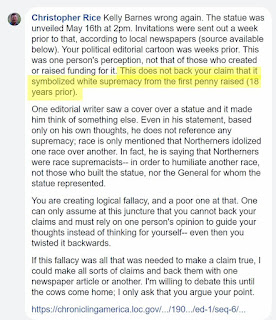They called him Colonel Galloway. That’s odd, because during
the War Between the States he was General Nathan Bedford Forrest’s
Aide-de-camp, and I’m not certain his position carried a rank in the
Confederate Army. I can’t prove it, but
I suspect he held the rank of Colonel in one of Memphis ’s
home guard militias (Memphis Minute Men perhaps) that was formed between 1857,
when he arrived in Memphis , and late June of
1862 when he left Memphis
Before and after the war, Galloway
was the editor and part owner of the Avalanche,
a staunch Democrat newspaper that never backed down from defending the cause of
the South long after the war was over.
By mid June of 1862, Federal authorities in Memphis
had suspended the Avalanche and
Galloway was in Grenada
Like another notable Confederate Memphis
wife, Mrs. Elizabeth Avery Meriwether, Mrs. Galloway was expelled from Memphis West Tennessee .
Mrs. Galloway, who was suspected of passing information to the Confederates, was
forced to leave days before Grant issued his infamous Special Order No. 14
(later revised and reissued as Special Order No. 15).
Galloway revived the Avalanche by New Year’s Day of 1866 in
a Memphis that remained under Federal occupation and was overrun not only by
black soldiers, carpetbaggers, and abolitionist teachers, but by thousands of
formerly enslaved people who mostly occupied South Memphis, Presidents Island,
and Fort Pickering (the area south of the Overton Tract and the Mississippi and Tennessee Rail Road depot.
If that wasn’t bad enough, the city itself was in the hands
of Irish Fenians who apparently ran roughshod over a drunken mayor, and most of
the old citizens had been disfranchised as a consequence of their loyalties.
Five months later, the day the last black soldiers in Memphis
The role Galloway and the Avalanche played in the atrocities can’t
be ignored. It was the Avalanche that
laid the blame for the atrocities squarely on the heads of the blacks
themselves. When we consider that the investigations revealed that aforementioned abolitionist teachers were on the mobs' (plural) hit lists, it’s more than a little odd that the the Avalanche's
call for restraint marked the end of the violence.
In the course of the (politically motivated) investigations
that followed, it was made clear by the “old citizens” that they deplored the
actions of the low born Irish, but that they were rendered helpless by order of
General Stoneman. What is missing from their denouncements is any effort or
expression of desire to hold the guilty parties accountable after the fact.
Worse was the lack of aid to help South
Memphis recover from the losses.
The massacre of 1866 was followed by the appearance of the
KKK in Memphis in
1867.
In Chapter XXIV of her memoir, Recollections, Elizabeth
Avery Meriwether herself rationalizes the atrocities committed by the KKK (her
husband, Minor, was one of “Supreme Grand Wizard” Forrest’s counselors and
lieutenants), and reveals how Galloway played a role
in obscuring the mere existence of the outlaw organization.
Fast forward ten years.
General Nathan Bedford Forrest died on the twenty-ninth of
October, 1877 and the funerary rites that followed were the topic of National news. The local papers that reported on the proceedings read like
a who’s who of Memphis
and the Mid South, unless you count the absence of the Independent Order of Pole Bearers or
any other notable black people.
The year after that, 1878, yellow fever made its annual appearance
in Memphis , and
it wouldn’t leave until October because it was accompanied by the warm mosquito
friendly winds of El Niño. The old citizens (with notable exceptions, the Mayor
for example) fled the city, and for the first time in our History, Memphis had a
black majority. Who is going to say they didn’t protect and indeed rescue Memphis that year?
Of course, the white families who returned to Memphis properly thanked
them, and then proceeded to send them back to South
Memphis .
I would say that things went back to business as usual, but 1878 was two years after Hayes-Tilden, one year after the death of Gen N B Forrest,
and less than a year before Memphis surrendered her charter.
Eighteen seventy nine was a significant year for our purposes because that was the year that
M C Galloway donated the very first penny for the Forrest monument.
Let’s be careful about how we throw the “white supremacist”
label around, but it is clear that M C Galloway did believe that white
supremacy was a natural, if not God ordained, fact of life (I suspect a number of black people believed it as well).
It would be twenty six years before the monument was
installed, and Memphis 's
attitude of white supremacy hardly changed for the better, what with lynch law, the pattern of bartering for and coercing black votes, and the ascendancy of a very young E H Crump that marked the turning
of the century.
More specific to the funding of the statue, I have to wonder
why Bob Church’s support is never mentioned.
You can object to my assertions on the grounds that we are
in no way accountable for the sins of the father, but how can we deny that
the noble symbolism of this particular monument is forever tainted by an image
that was considered appropriate matter for a city newspaper?
One last question: How can Memphis
be expected to embrace her Confederate Heritage, if we can’t bring ourselves to
own our History?
Peace Y’all





